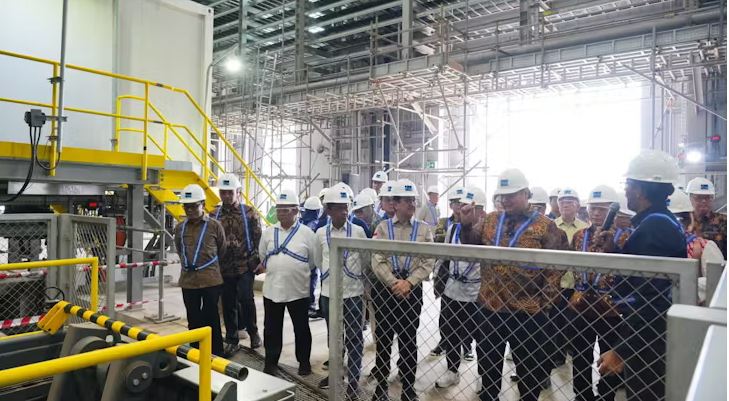PT Freeport Indonesia (PTFI) menghadiri acara peresmian operasi smelter tembaga baru di Kawasan Ekonomi Khusus (KEK) Java Integrated Industrial and Port Estate (JIIPE), Gresik, Jawa Timur. Acara ini dihadiri oleh Menteri Koordinator Bidang Perekonomian Airlangga Hartarto, Menteri Investasi/Kepala BKPM Bahlil Lahadalia, dan Presiden Direktur PTFI Tony Wenas.

Peresmian operasi smelter dilakukan di depan area Tangki Asam Sulfat, dengan penekanan tombol sirine sebagai tanda dimulainya operasi smelter dan penandatanganan prasasti. Turut hadir dalam acara ini Pj. Gubernur Jawa Timur yang diwakili Pj. Sekdaprov Jawa Timur Bobby Soemiarsono, serta Bupati Gresik Fandi Akhmad Yani. Smelter baru PTFI memiliki kapasitas produksi 1,7 juta ton untuk memurnikan konsentrat tembaga menjadi katoda tembaga dan lumpur anoda. Lumpur anoda tersebut kemudian dimurnikan di Precious Metal Refinery (PMR) menjadi emas, perak batangan, serta Platinum Group Metals (PGM).
Membuka potensi ekonomi besar dari tembaga
Presiden Direktur PTFI, Tony Wenas, menegaskan bahwa pembangunan smelter baru ini merupakan wujud komitmen PT Freeport Indonesia dalam mendukung kebijakan hilirisasi mineral tembaga yang dicanangkan pemerintah. Menurutnya, kebutuhan tembaga di masa depan akan semakin meningkat di seluruh dunia. Dalam konteks transisi energi yang sedang berlangsung di negara-negara lain, permintaan akan tembaga akan terus bertambah.
Keputusan Presiden Joko Widodo untuk membangun smelter baru sesuai dengan IUPK adalah langkah yang tepat dan strategis. Hal ini akan mempercepat pembentukan ekosistem kendaraan listrik dan memajukan industri pertambangan Indonesia. Proses pembangunan smelter Freeport, yang direncanakan berlangsung selama 30 bulan, merupakan bagian dari kesepakatan dalam IUPK.
Diharapkan bahwa smelter ini akan mulai beroperasi pada Agustus dan mencapai kapasitas penuh pada Desember 2024. Dengan demikian, Indonesia akan semakin mandiri dalam industri pertambangan tembaga dan dapat memenuhi kebutuhan pasar global dengan efisien dan berkelanjutan.
English Version
The World’s Largest Freeport Copper Smelter in Gresik Officially Operates
PT Freeport Indonesia (PTFI) recently attended the inauguration ceremony of their new copper smelter operation at the Java Integrated Industrial and Port Estate (JIIPE) Special Economic Zone in Gresik, East Java. The event was graced by the presence of Minister of Economic Affairs Airlangga Hartarto, Investment Minister/Head of BKPM Bahlil Lahadalia, and PTFI President Director Tony Wenas.
The smelter inauguration took place in front of the Sulphuric Acid Tank area, with the symbolic pressing of the siren button marking the beginning of operations and the signing of a commemorative plaque. Also in attendance were the Acting Governor of East Java, represented by the Acting Secretary of East Java Bobby Soemiarsono, and Gresik Regent Fandi Akhmad Yani.
The new PTFI smelter has a production capacity of 1.7 million tons to refine copper concentrate into copper cathodes and anode sludge. This anode sludge is further purified at the Precious Metal Refinery (PMR) to produce gold, silver bullion, and Platinum Group Metals (PGM).
Unlocking the huge economic potential of copper
President Director of PTFI, Tony Wenas, has emphasized that the construction of a new smelter is a manifestation of PT Freeport Indonesia’s commitment to supporting the government’s policy on downstreaming copper minerals.
He believes that the demand for copper in the future will continue to increase worldwide. With the ongoing energy transition in other countries, the demand for copper will only grow. President Joko Widodo’s decision to build a new smelter in accordance with the IUPK is a correct and strategic step.
This will accelerate the formation of the electric vehicle ecosystem and advance Indonesia’s mining industry. The construction process of the Freeport smelter, planned to last for 30 months, is part of the agreement within the IUPK. It is expected that the smelter will start operating in August and reach full capacity by December 2024.
Consequently, Indonesia will become more self-sufficient in the copper mining industry and be able to efficiently and sustainably meet the needs of the global market.
 P A G A R A S Pagaras (Papua Garis Keras) merupakan lembaga Swadaya Masyarakat yang bertujuan untuk menghimpun potensi berbagai pihak yang terkait isu Papua
P A G A R A S Pagaras (Papua Garis Keras) merupakan lembaga Swadaya Masyarakat yang bertujuan untuk menghimpun potensi berbagai pihak yang terkait isu Papua
